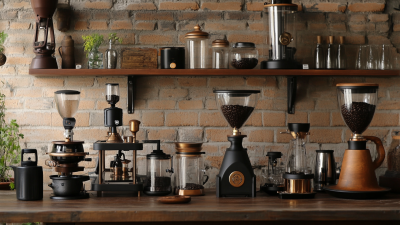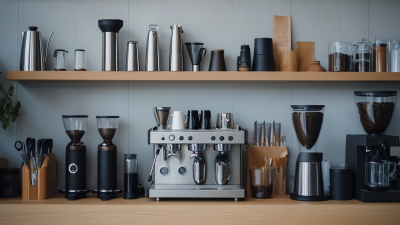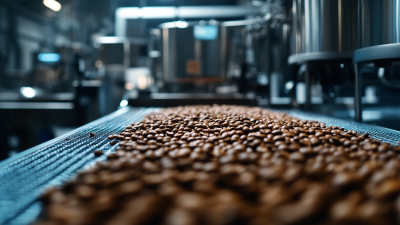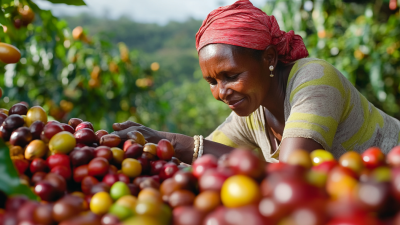
Trends in Robot Barista Technology for 2025 and Innovative Approaches to Optimize Coffee Services
As we approach 2025, the landscape of coffee service is poised for transformation, largely driven by advancements in Robot Barista technology. This innovative field combines artificial intelligence, robotics, and customer service, promising to redefine how we experience our daily coffee rituals. The emergence of Robot Baristas is not just a fleeting trend; it signifies a shift towards efficiency, personalization, and sustainability in coffee preparation. With the continuous evolution of machine learning algorithms and robotics, we can expect a new generation of smart machines that understand consumer preferences and can adapt to provide tailored coffee experiences.
Moreover, the integration of innovative approaches in optimizing coffee services will play a crucial role in setting businesses apart in a competitive market. From contactless service models to enhanced customer interactions through data analytics, Robot Baristas are paving the way for a seamless customer experience. As we delve into the latest trends in Robot Barista technology for 2025, it becomes evident that the future of coffee service is not just about perfecting the brew but also about enhancing the overall customer journey in a digital-first world.
Read more »
 By:Sophia - May 12, 2025
By:Sophia - May 12, 2025

7 Ultimate Reasons to Choose Your Perfect Latte Robot
In today's fast-paced world, the demand for convenience without compromising quality has led to the rise of innovative kitchen gadgets. Among these, the Latte Robot stands out as a game-changer for coffee enthusiasts and casual drinkers alike. This remarkable machine not only simplifies the process of crafting your favorite caffeinated beverages but also elevates the experience, ensuring a consistently delicious cup of latte at the touch of a button. With the hustle and bustle of daily life, more people are seeking ways to enjoy café-quality drinks from the comfort of their own homes.
The allure of the Latte Robot lies in its ability to combine advanced technology with user-friendly design, making it accessible to everyone—regardless of barista skills. In this blog, we will explore seven ultimate reasons why investing in a Latte Robot can transform your coffee routine. Whether you're a seasoned coffee aficionado or simply looking to indulge in the perfect latte, these compelling benefits will help you understand why a Latte Robot is the ideal addition to your kitchen arsenal. Get ready to discover the effortless way to enjoy gourmet lattes at home!
Read more »
 By:Sophia - May 10, 2025
By:Sophia - May 10, 2025

Exploring the Unique Features and Ideal Uses of Home Coffee Products
In today's fast-paced world, the comfort of a perfectly brewed cup of coffee at home has become an essential ritual for many. As coffee enthusiasts seek to replicate the café experience within the cozy confines of their kitchens, the market for home coffee products has flourished, offering an array of innovative tools and gadgets. From espresso machines to manual pour-over kits, these products cater to diverse brewing preferences and skill levels, transforming the way we enjoy our daily cup. Exploring the unique features of these home coffee tools can help both novice and experienced brewers make informed decisions that elevate their coffee-making experience.
This blog delves into the distinct characteristics of popular home coffee products and their ideal uses. By understanding the nuances of each device, coffee lovers can select the right tools that suit their individual tastes, lifestyles, and brewing techniques. Whether you're a fan of rich espresso, a lover of delicate pour-overs, or someone who simply enjoys a good drip brew, navigating the world of home coffee products can be both exciting and overwhelming. Join us as we uncover the essentials that will enhance your home brewing adventure and ensure that every sip is a delightful journey.
Read more »
 By:Sophia - May 9, 2025
By:Sophia - May 9, 2025

Unlocking the Secrets to Creating Your Perfect Home Coffee Bar Experience
As the coffee culture continues to blossom around the globe, the concept of a "Home Coffee Bar" has emerged as a popular trend among coffee enthusiasts. According to a recent report by the Specialty Coffee Association, approximately 79% of American adults drink coffee, and nearly 50% are investing in quality brewing equipment for their homes. This surge in home brewing reflects a growing desire for a personalized coffee experience, where individuals can curate their favorite beans, brewing methods, and flavors, transforming their mundane morning routine into a delightful ritual.
Creating your perfect home coffee bar not only enhances your coffee experience but also serves as an avenue for creativity and self-expression. Data from the National Coffee Association indicates that consumers are increasingly seeking premium coffee experiences, with over 20% stating they prefer artisanal or specialty coffee at home. By unlocking the secrets to designing a tailored coffee bar, you can embrace this evolving landscape of home brewing, taking your coffee enjoyment to new heights while also enjoying potential cost savings compared to frequent café visits. The journey to developing your perfect home coffee bar experience starts here, promising to elevate your daily brew into a moment of joy and sophistication.
Read more »
 By:Sophia - May 7, 2025
By:Sophia - May 7, 2025

Essential Guide: 10 Must-Have Items for Every Barista Coffee Enthusiast
In the world of coffee, the role of a barista has evolved significantly, transforming into a highly skilled profession that requires both knowledge and an array of essential tools. According to the National Coffee Association, approximately 70% of Americans report that they consume coffee daily, underscoring the growing importance of expertly crafted beverages in our daily lives. This surge in coffee culture has prompted an increased demand for skilled individuals trained in the art of preparing coffee, making the role of a barista pivotal in providing quality customer experiences at cafes and coffee shops.
For barista coffee enthusiasts, having the right equipment and tools is crucial to elevate their brewing skills and produce the perfect cup. A study by the Specialty Coffee Association indicates that 82% of consumers are willing to pay more for high-quality coffee, further emphasizing the importance of baristas having access to essential items that enhance their craft. Whether you’re an aspiring barista or a seasoned coffee lover looking to perfect your brewing technique, understanding the must-have tools will not only improve your coffee-making process but also enrich your overall appreciation for this beloved beverage.
Read more »
 By:Ethan - May 6, 2025
By:Ethan - May 6, 2025

Ultimate Guide to Mastering Barista Coffee Skills at Home
As coffee culture continues to thrive globally, the art of making the perfect cup of coffee has gained unprecedented popularity. A recent report from the Specialty Coffee Association revealed that over 60% of Americans drink coffee daily, with a growing interest in brewing techniques and specialty drinks. This shift in consumer behavior highlights the demand for high-quality, barista-level coffee experiences that can be created in the comfort of one’s home. With more enthusiasts aspiring to master the skills of a professional barista, the need for comprehensive guidance on brewing techniques, equipment, and flavor profiles has never been greater.
In this ultimate guide to mastering barista coffee skills at home, we will explore essential methods and tips that empower coffee lovers to elevate their brewing game. From understanding different brewing methods to perfecting espresso shots, our guide aims to equip you with the knowledge and skills to produce café-quality beverages. Join us on this journey as we delve into the intricacies of barista coffee, transforming your home kitchen into your very own coffee shop.
Read more »
 By:Sophia - May 6, 2025
By:Sophia - May 6, 2025

Mastering the Art of Choosing Barista Cups for Your Coffee Shop Success
The coffee industry continues to grow at an impressive rate, with a projected market value of over $450 billion by 2028, according to recent reports from market research firms. As coffee consumption rises, the experience consumers have in coffee shops becomes increasingly critical to success. One key element of this experience is the choice of Barista Cups, which can significantly influence customer perception and satisfaction. Research indicates that presentation plays a crucial role in consumer enjoyment, with 83% of coffee drinkers stating that a well-presented beverage enhances their overall coffee experience. Investing in the right Barista Cups can thus not only elevate a coffee shop's aesthetic but also contribute to customer loyalty and increased sales.
Choosing Barista Cups involves more than just aesthetics; it encompasses considerations of functionality, sustainability, and brand alignment. Recent studies show that 60% of consumers prefer drinking from eco-friendly cups, emphasizing the importance of sustainability in today's market. Furthermore, the right cup can enhance the flavor profile of the coffee, as the materials and design affect aroma and temperature retention. By mastering the art of choosing Barista Cups, coffee shop owners can create an inviting atmosphere, promote their brand values, and ultimately drive their business's success.
Read more »
 By:Oliver - May 2, 2025
By:Oliver - May 2, 2025

Exploring the Unique Features and Applications of Coffee Barista Products for Global Buyers
In recent years, the coffee culture has experienced unprecedented growth, becoming a staple in many people's daily routines around the globe. As the demand for expertly crafted coffee beverages rises, so too does the interest in Coffee Barista products, which play a crucial role in enhancing the coffee brewing process. These products, ranging from precision grinders to innovative brewing equipment, are designed to elevate the art of coffee-making, ensuring that each cup delivers a perfect balance of flavor and aroma. For enthusiasts and professional baristas alike, understanding the unique features and applications of these tools can significantly enhance both the brewing experience and the ultimate enjoyment of coffee.
As global buyers seek to invest in high-quality Coffee Barista products, it becomes essential to explore what sets these items apart in terms of functionality, design, and versatility. From sustainable sourcing practices to cutting-edge technology, the landscape of coffee equipment is continually evolving to meet the needs of diverse consumers. This blog aims to delve into the distinctive characteristics of Coffee Barista products while highlighting their various applications, offering valuable insights to buyers around the world who are eager to elevate their coffee crafting game.
Read more »
 By:Oliver - April 30, 2025
By:Oliver - April 30, 2025

Navigating Global Import Export Standards for Home Barista Equipment
In recent years, the global coffee market has witnessed a significant shift, with the rise of the "Home Barista" trend at the forefront. According to a report by Allied Market Research, the global coffee equipment market is expected to reach $22.71 billion by 2027, growing at a CAGR of 6.4%. This growth is fueled by the increasing number of coffee enthusiasts opting to create café-quality beverages in the comfort of their own homes. As the popularity of home brewing continues to soar, understanding the complexities of import-export standards for home barista equipment becomes paramount for both consumers and retailers.
Navigating the myriad of regulations and standards that govern the international trade of coffee-related products can be challenging. The complexities arise not only from varying country-specific regulations but also from compliance with quality and safety certifications that ensure consumer protection. A report from Research and Markets highlights that compliance with such standards can reduce the risk of product recalls and enhance brand reputation. Hence, as the Home Barista movement propels more individuals into the market, it is crucial to align sourcing strategies with global import-export standards to effectively meet consumer demand while maintaining quality and compliance.
Read more »
 By:Sophia - April 28, 2025
By:Sophia - April 28, 2025

Achieving Superior Quality in Coffee Bean Production and How to Ensure Your Supply Chain Compliance
Projections indicate that the global coffee market will receive an unprecedented boost, with estimates pegging it at USD 102.15 billion by 2024 (ResearchAndMarkets, 2020) at a growth rate of 5.5%. Within this vibrant industry, demand for high-quality coffee beans is emerging more than ever before, indicating a shift in consumer preference toward premium products. A report from the Specialty Coffee Association states that around 70% of consumers are willing to pay additional costs for sustainably sourced, good quality coffee, demanding that producers change their practices to respond to the evolving market standards.
To produce superior quality coffee beans, a firm must not only work on growing methods and selection but also ensure compliance throughout the supply chain. Transparency in production and sustainability are key factors in developing consumer trust and brand loyalty, according to the International Coffee Organization. By concentrating on high-quality coffee beans and strictly adhering to supply chain regulations, producers will improve their image, creating a guarantee of consistency in the quality of their products, thus enabling them to carve for themselves a greater chunk of the ever-increasing premium coffee market.
Read more »
 By:Ethan - April 26, 2025
By:Ethan - April 26, 2025

Understanding the Quality Standards for Roasted Coffee in Global Supply Chains
As per October 2023, the market dynamics mean that quality standards for roasted coffee are becoming an important part of the equation for consumer satisfaction and competitiveness in the commodities market. Global consumption of coffee rose this year to 166.63 million 60-kilogram bags in 2021 and shows increasing demand for roasting coffee of different quality across several regions, as stated by the International Coffee Organization (ICO). However, consumers are becoming more discriminatory in high-quality preferences and tend toward special-quality coffees that espouse the values of sustainability and ethical sourcing practices. Therefore, knowing the intricate quality standards defined in the supply chain is a major prerequisite for producers and retailers alike if they are to survive in such a dynamic situation.
The Specialty Coffee Association also reports that about 40 percent of consumers are willing to pay a premium for certified-quality coffee. The point about roasting is intensively important; it underpins the correlation between the chemical factors of aroma, flavor, acidity, body, and aftertaste-the more these refer to overall coffee experience. Hence, the stakeholders in the coffee industry must start considering these quality standards more vigorously so as to achieve product consistency and fulfill the demanding palate of today's coffee consumer. By understanding and adopting these standards, various actors in the global roasted coffee supply chain can encourage sustainable development and cultivate long-term customer loyalty.
Read more »
 By:Ethan - April 25, 2025
By:Ethan - April 25, 2025

Mastering Home Coffee Essentials for Global Buyers to Enhance Your Sourcing Strategy
The latest trends indicate a high demand for home coffee products in the ever-changing coffee business. Meanwhile, global buyers seeking to improve their sourcing strategies should understand what constitutes good home coffee. Starting from the right selection of beans to investing in quality brewing equipment; getting these factors right can hugely affect end-customer satisfaction and the success of any sourcing strategy.
This blog seeks to throw light on the fundamental factors affecting home coffee essentials and, thus, be fruitful for all global buyers interested in improving procurement. Trends, quality, and consumer preferences in these three areas will be examined to see how strategic sourcing in the home coffee segment can create some very sweet opportunities and sustainable relationships within the ever-competitive coffee sector. This way, while giving the buyers knowledge, we can promote a deeper appreciation of home coffee culture and help businesses get prepared to meet the rising demand coming from coffee lovers across the world.
Read more »
 By:Sophia - April 23, 2025
By:Sophia - April 23, 2025

Future Innovations Shaping the Home Coffee Bar Experience for Global Buyers
The Home Coffee Bar is thus emerging as a significant trend in defining present consumer behavior amidst a growing global market for coffee. About 59% of coffee drinkers now brew coffee at home at least once a week, according to the Specialty Coffee Association-recent survey, indicating a shift toward home brewing. This has led to the trend toward the home brews in part through the availability of excellent equipment and artisanal beans to recreate that cafe experience from the comforts of home.
From another angle, Statista's market research states that the worldwide coffee market would reach $102.15 billion by 2024. This signifies a growing investment in premium and artisanal coffee products across the globe. Innovations in technology, flavor customization, and education resources are revolutionizing the home coffee bar experience as consumers create the café experience at home. This blog will dwell on future innovations that will change consumer relations with their coffee habits, keeping in mind changing global consumer demand.
Read more »
 By:Sophia - April 22, 2025
By:Sophia - April 22, 2025

Unlocking Global Tastes: The Rise of Customized Coffee Solutions in the Specialty Market
The specialty coffee market has witnessed a revolutionary change in recent years, with the ever-increasing demand from consumers for providing them with experiences that suit their divergent preferences. Distinctive flavours and brewing methods have become the norm, and coffee lovers have opened doors to a whole universe of Customized Coffee solutions. This budding trend not merely allows individuals to rejoice in their taste profiles but also enhances the interaction between coffee producers and consumers.
Customized coffee has changed everything-the way people think about and drink coffee-giving them options that are beyond conventional. From single-origin products to personalized blends created by artisanal roasters, the specialty coffee industry utilizes these dynamics of customization. In this project, we will examine some reasons behind why Customized Coffee is gathering momentum, how innovation, and engaging consumers are changing coffee experience culture the world over.
Read more »
 By:Sophia - April 20, 2025
By:Sophia - April 20, 2025

How to Identify Top 7 Manufacturers of Robot Coffee Machines for Your Global Procurement Needs
Robot Coffee machines have made a big difference in the coffee industry, which has changed a lot due to automation in recent years. Fortune Business Insights reports that the global coffee machines market is projected to be worth USD 38.86 billion by 2026, with automation and the high acceptance of this technology being the key growth drivers. Insofar that consumers simply want their coffee made as effortlessly and as uniformly as possible, the demand for Robot Coffee machines will peak in order for procurement professionals to identify the key manufacturers in what is now a very new industry.
To properly compete in Robot Coffee machine applications, a good understanding of the top manufacturers is much needed for global procurement strategies. Market research from trustworthy firms like Mordor Intelligence predicts that increased coffee consumption, especially by millennials, is propelling the demand for high-tech coffee solutions. Business partnerships with the right manufacturers are critical for improving customer satisfaction and streamlining operations for competitive advantages. The following blog will discuss seven leading Robot Coffee machine manufacturers, their product insights as well as contributions towards a new coffee culture.
Read more »
 By:Oliver - April 19, 2025
By:Oliver - April 19, 2025


